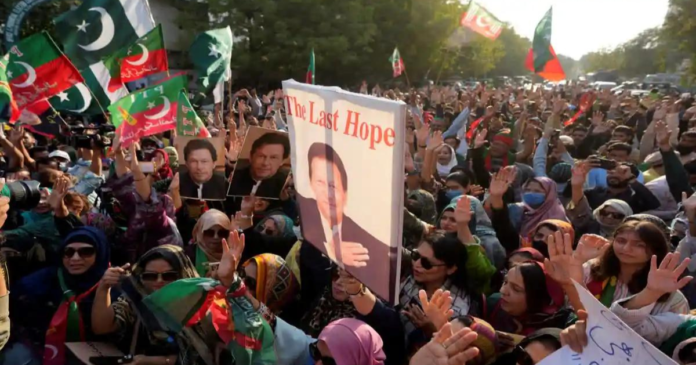Among analysts, both inside and outside Pakistan, there is total confusion. In much-discussed TV discussions, pundits claiming to be experts projected that Imran Khan would win a landslide victory and that the other parties would be wiped out.
As usual, reality disproved their claims. Another alliance is what Pakistan anticipates, which translates into instability and—surprise—more room for army maneuvering.
The magnitude of pre-poll match fixing is now widely known. Not only was Imran Khan and a group of his party colleagues imprisoned, but the extreme overreach involved accusing his wife Bushra Bibi of “contracting marriage during the ‘Iddat’ (period of waiting)” of the former first lady, resulting in a seven-year jail sentence and a fine of Rs 0.5 million each person.
The former prime minister was found guilty for the third time in a row after that, and the “Iddat” case was largely viewed as an attempt at character assassination because there wasn’t much further evidence.
Except for a case involving the theft of gifts intended for the prime minister’s office at a significantly reduced cost, the army has been unable to demonstrate personal corruption despite its best efforts. In South Asian politics, that is a small fry.
Regarding the grave accusation of treason for openly addressing a purportedly “secret” cable that revealed a US plot to depose him, it is purely political, at least in the eyes of the electorate.
Pakistan election rigging
Fixing post-election issues is not a simple task, despite numerous attempts. The case that has received the greatest attention is that of Nawaz Sharif, whose victories in the Mansehra and Lahore seats (NA-130 and NA-135) are both extremely dubious.
In the first, the figures on Form 47, which is issued by the Election Commission of Pakistan, are inconsistent, and in the second, an investigation appears to indicate that Nawaz received 80,382 votes, compared to Gushtap Khan of the PTI, who received 105,249 votes and was elected.
This author discovered more while watching emerging numbers. Given his spiritual background in the “city of saints,” PTI leader Shah Mehmood Qureshi’s family has been winning elections in Multan for decades. However, in a much-delayed count, his daughter Meher Bano, who was comfortably leading the count and trailing a Pakistan People’s Party candidate, unexpectedly lost to the son of former prime minister Yousaf Raza Gillani, who was trailing third. However, several significant victories were “allowed.”
Latif Khosa of the PTI is one of them; he defeated Khwaja Asif, a seasoned leader of the Pakistan Muslim League. At a time when nearly everyone was quitting the PPP, Khosa stormily left the party and joined the PTI. Another victory for Zartaj Gul in DI Khan; he had already pulled off a stunning escape after being detained on several occasions and then given protective bail.
Subsequently, one of the most reputable politicians, Jibran Nasir, made accusations (not claims), stating that while polling places had a strong showing for the PTI, they were making an attempt to justify their actions by failing to provide polling agents with the completed form. Then there are recordings showing voters in Balochistan and Khyber Pakhtunkhwa, who are typically the most courted due to their virtual “election,” throwing out ballot boxes in addition to terrorist acts that stop voting. In summary, the final judgment. At this, the Pakistani army is appalling. The level of obvious effort suggests either insufficiency or desperation, or both.



